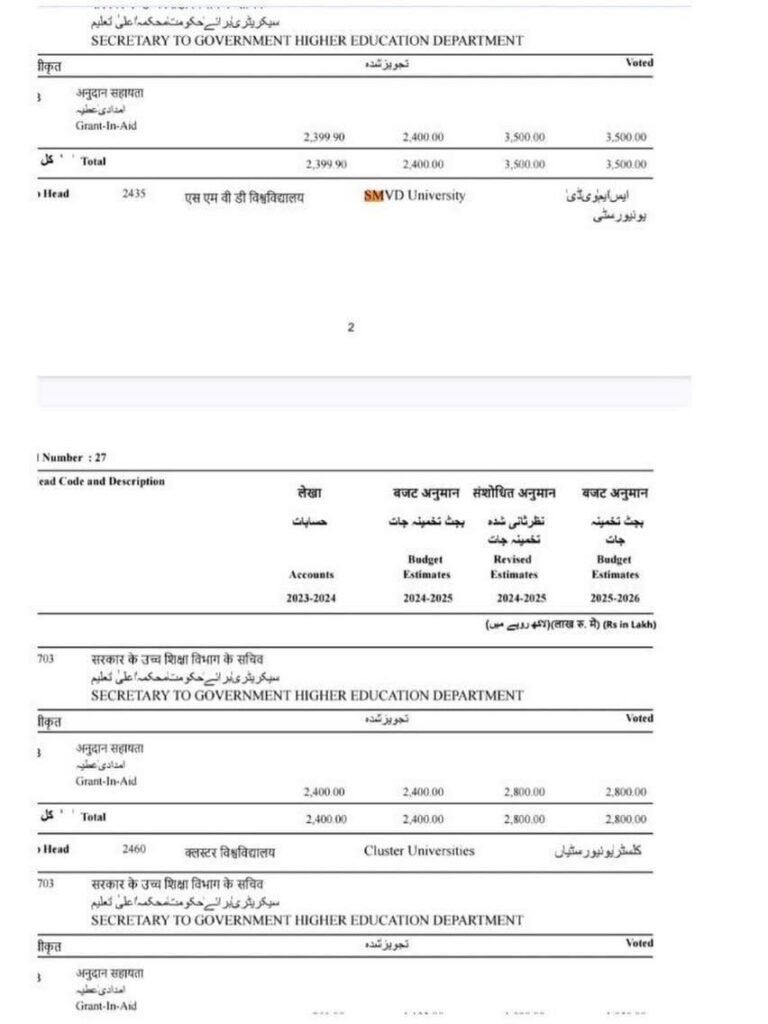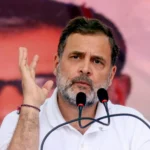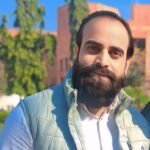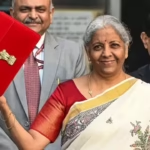Debate Intensifies Over Shrine Board Medical College as Government Grants Come Under Spotlight
Government Grants Contradict Claim of Donation-Driven Functioning, Public Money Means Public Rights says NC’s Tanveer Sadiq
Asif Iqbal Naik || Jammu- 26-Nov:
A political storm has erupted in Jammu & Kashmir following comments by Leader of the Opposition (LoP) Sunil Sharma, who linked the functioning of the Shri Mata Vaishno Devi University and its affiliated medical college to the “sentiments” of devotees donating at the Mata Vaishno Devi Shrine.
Following LoP Sunil Sharma remarks, now NC’s MLA Zadibal Tanveer Sadiq hit back at Sharma. In response, MLA from Zadibal, Tanveer Sadiq, clarified the financial structure of the University. He stated that the Jammu & Kashmir Government provides substantial grant-in-aid, noting that the University received ₹24 crore last year and ₹28 crore this year. These figures demonstrate that government funding forms a significant portion of the institution’s revenue, contradicting Sharma’s narrative that donations are the primary source.
Sharma’s remarks, critics say, have sparked a communal and political debate over access, funding, and governance of government-supported institutions.
Political Stakes Behind the Controversy
Observers say the controversy is not merely about funding; it touches on broader political narratives in the Union Territory. By emphasizing the role of shrine donations, Sharma is perceived to be mobilizing a religious sentiment narrative, which some analysts suggest could influence political discourse ahead of elections and public debates on governance in near future.
Political opponents argue that such remarks risk alienating non-Hindu communities from a government-funded institution and raise questions about meritocracy, transparency, and inclusivity in higher education. Several regional leaders have condemned the remarks, saying public institutions cannot and should not be treated as extensions of religious establishments.
Leader of the Opposition (LoP) Sunil Sharma made comments about the Shri Mata Vaishno Devi University and its affiliated medical college, invoking the “sentiments” of devotees who donate to the Mata Vaishno Devi Shrine. Sharma suggested that the institution primarily relies on these donations for its functioning, sparking criticism and debate over the role of public funding versus shrine contributions.
Roots of the Controversy
The controversy stems from Sharma’s remarks during a recent interview and public appearances, where he implied that donor sentiments at the shrine should influence institutional decisions, including admissions and administration. Critics argue that linking a publicly funded educational and medical institution to religious sentiments risks communalising a secular space meant to serve all citizens of the Union Territory equally.
Political opponents, civil society members, and academics also raised concerns that such statements could create confusion among students and parents about the eligibility and inclusivity of the institution, potentially discouraging participation from communities that are not part of the shrine’s donor base.
MLA Tanveer Sadiq Highlights Government Funding added that Public Money means Public Rights over the institutions which received grant in aid from the Government.

Tanveer Sadiq and legal observers emphasise that once public money is involved, the institution becomes a public entity accountable to all residents of the UT, irrespective of religion or community. Constitutional principles guarantee equal access, representation, and opportunity in government-funded educational and healthcare institutions.
Opposition and Academic Community React
Critics have described Sharma’s remarks as “misleading” and warned that invoking religious sentiments around a government-funded institution could erode the secular and inclusive ethos of higher education in the region. Student bodies and faculty members stressed the importance of maintaining transparency, fairness, and meritocracy, especially in medical education, where public trust is crucial.
Shrine Board Contributions Are Supplementary
While the Shri Mata Vaishno Devi Shrine Board does contribute to infrastructure and development, experts clarify that these contributions are supplementary. The steadily increasing government grants underscore the State’s commitment to providing modern, accessible, and secular education and medical facilities to all citizens.
Call for Responsible Political Statements
Observers have urged political leaders to exercise caution and ensure factual accuracy when discussing public institutions. Statements that conflate religious donations with public funding risk not only misleading citizens but also fostering unnecessary communal tensions in the UT.









